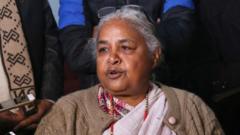Did a Woman Who Bit Off Her Alleged Rapist's Tongue Just Get Acquitted After 61 Years?

Published: 2025-09-12 14:47:23 | Category: News
Choi Mal-ja, a South Korean woman who famously bit off her rapist's tongue during a violent assault in 1964, has been acquitted of her conviction after nearly 60 years. A recent court ruling recognised her actions as self-defence, highlighting the need for a reevaluation of how sexual violence victims are treated in the legal system.
Last updated: 02 October 2023 (BST)
Key Takeaways
- Choi Mal-ja was initially convicted in 1964 for biting off her attacker’s tongue.
- The court recently ruled her actions were a legitimate act of self-defence.
- Choi's case reflects broader issues regarding the treatment of sexual assault victims in South Korea.
- Her retrial was influenced by the #MeToo movement, which has encouraged victims to speak out.
- Prosecutors have publicly apologised for the injustices Choi faced during her original trial.
The Incident: 1964 Assault and Immediate Aftermath
On a fateful evening in May 1964, Choi Mal-ja was an 18-year-old woman living in Gimhae, South Korea, when she became the victim of a brutal sexual assault. Her attacker, a 21-year-old man known only as Roh, pinned her to the ground and attempted to suffocate her while forcing his tongue into her mouth. In a moment of desperation, Choi bit off a significant portion—1.5 cm—of Roh's tongue, managing to escape his grasp.
Seventeen days later, Roh retaliated by breaking into Choi’s home and threatening her father with a knife. This act of intimidation led to Choi being prosecuted for inflicting grievous bodily harm on Roh, despite being the victim of a violent crime. She was convicted and sentenced to ten months in prison, while Roh received a mere six-month suspended sentence for his actions, a disparity that highlights systemic failures within the legal framework at the time.
A Legal Battle Spanning Decades
For decades, Choi lived with the stigma of her conviction, which overshadowed her experience as a sexual assault survivor. Her testimony during the original trial was met with scepticism, and questions about her relationship with her attacker were not uncommon. One judge even suggested that Choi should consider marrying Roh, a statement that exemplifies the gender biases prevalent in the legal system during that era.
Choi’s fight for justice was reignited in 2018, motivated by the global #MeToo movement, which encouraged many survivors of sexual violence to share their stories and seek accountability. Choi sought to have her case reevaluated, not only for her own justice but to serve as a beacon of hope for other victims who might feel voiceless.
The Retrial: A Turning Point
In July 2023, Choi's case came to a retrial, and the outcome was significantly different from her original trial nearly six decades prior. The Busan district court acknowledged that her actions were a proportionate response to an "unjust infringement on her bodily integrity and sexual self-determination." This ruling marked a critical turning point, as it established legal recognition of Choi's right to defend herself against sexual violence.
Choi’s supporters celebrated the ruling outside the court, holding placards emblazoned with phrases such as "Choi Mal-ja did it!" and "Choi Mal-ja succeeded!" The emotional response from both Choi and her supporters was palpable, reflecting the long-awaited sense of justice and vindication.
Impact of the #MeToo Movement
The resurgence of Choi's case in the context of the #MeToo movement underscores the ongoing struggles that survivors of sexual violence face within the legal system. The movement has catalysed discussions around the treatment of victims, the importance of believing survivors, and the need for legal reforms that better protect individuals from similar experiences.
Choi's determination to pursue justice despite numerous discouragements serves as a testament to the resilience of survivors. She has expressed her desire to inspire others who have endured similar traumas, stating, "For the victims who shared the same fate as mine, I wanted to be a source of hope for them."
Prosecutors' Apology and Recognition of Injustice
In a significant shift from the past, prosecutors publicly apologised for the treatment Choi received during her original trial. They acknowledged the "immeasurable pain and suffering" they had caused her and officially declared her innocent. This acknowledgment not only highlights the flaws in the legal proceedings of 1964 but also represents a crucial step toward healing for Choi and many others affected by similar injustices.
A Broader Context: Sexual Violence in South Korea
Choi Mal-ja's case sheds light on the broader issues of sexual violence in South Korea, where societal attitudes have historically placed the burden of proof on victims rather than perpetrators. This systemic issue has often led to underreporting of sexual assaults and a culture of silence surrounding victims' experiences.
Recent efforts to reform laws and attitudes concerning sexual violence have gained momentum, driven by increasing public awareness and advocacy. The legal system is gradually evolving to offer better protection and support for victims, but significant work remains.
Looking Forward: What Happens Next?
As Choi Mal-ja's case continues to resonate, it sparks conversations about legal reforms and societal change regarding how sexual violence is addressed. The recent ruling not only vindicates Choi but also serves as a clarion call for greater accountability and support for survivors.
Choi’s bravery in fighting for her truth may inspire others to seek justice, further highlighting the necessity for comprehensive support systems for victims of sexual violence. The legal system must adapt to ensure that survivors are treated with dignity and respect, recognising their autonomy and right to defend themselves.
Choi Mal-ja’s journey from conviction to acquittal is a powerful reminder of the importance of listening to survivors and believing their stories. As society continues to grapple with the aftermath of sexual violence, the conversations surrounding Choi's case are likely to influence future legal and societal norms. How will we ensure that justice is accessible to all victims? #JusticeForSurvivors #MeToo #ChoiMalJa
FAQs
What happened to Choi Mal-ja in 1964?
In May 1964, Choi Mal-ja was sexually assaulted by a man named Roh. During the attack, she bit off part of his tongue and was later convicted of inflicting bodily harm, while Roh received a much lighter sentence.
Why was Choi Mal-ja acquitted after so many years?
Choi was acquitted in a recent retrial because the court recognised her actions as self-defence against an unjust attack on her bodily integrity and autonomy.
What impact did the #MeToo movement have on Choi's case?
The #MeToo movement encouraged Choi to pursue a reevaluation of her case, highlighting the need for justice for survivors of sexual violence and influencing societal attitudes toward such issues.
What did the prosecutors say about Choi's original conviction?
Prosecutors publicly apologised for the mistreatment Choi experienced during her original trial and declared her innocent, acknowledging the pain they caused her.
How has Choi's case influenced discussions about sexual violence in South Korea?
Choi's case has brought attention to the need for legal reforms and better treatment of sexual violence victims, contributing to ongoing conversations about justice and support for survivors in South Korea.



